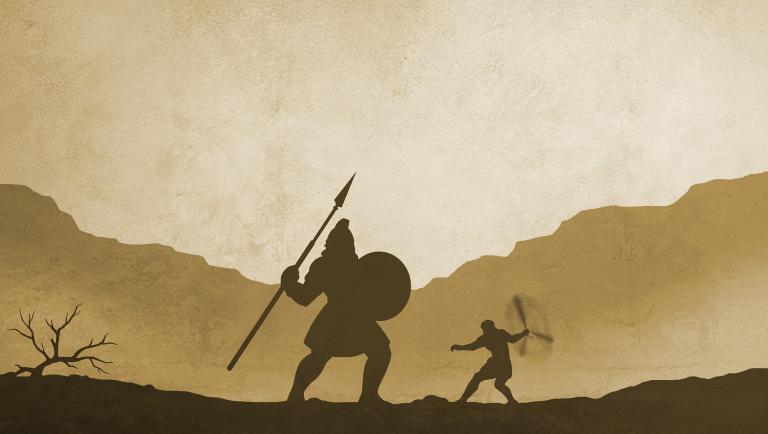
Anyone familiar with the Bible is acquainted with the depictions of violence and slavery. Too often, critics of religion cite these unsavory acts as evidence that religion is dangerous, and if God exists, He is violent.
This paper intends to discuss these difficult passages, particularly as they appear in the Old Testament. I will also place such violence in the broader context of the ancient world. Lastly, I will show the link between violence and justice and the need for a lawgiver.
Violence in the Bible
The first act in the Bible following the expulsion from the Garden of Eden is Cain murdering his brother Abel. This murder is one of several acts of violence depicted in the Old Testament. Slavery, too, is portrayed and we read how enslaved people are to be treated and kept. (See Exodus 21:2-8).
Perhaps most troubling of all are verses referring to the “ban.” These biblical verses include God commanding the destruction of various peoples.
In order to understand both the ban and slavery, we must place them into the proper historical context.
Ancient world, violent world
The Old Testament is inclusive of a time period from approximately 2000 BC to 400 BC. This time period includes the empires of Greece and Rome. Smaller kingdoms such as the Assyrians and Amalek nation were also prominent.
Child and animal sacrifices were a common practice among these cultures. Human sacrifice was associated with various funerary practices, such as the death of kings. Animal sacrifices were an integral part of Greek and Roman pagan religions. (See Laerke Recht, Human Sacrifice in the Ancient Near East and Egypt).
In addition, slavery was widespread. The treatment of enslaved people included beatings and torture. Religious practices often involved male and female prostitution. (See Konstantinos Kapparis, Prostitution in the Ancient Greek World).
The point to understand is the need to place the events of the Old Testament within a larger context of the ancient world. Violence and immorality were part of the milieu that the Old Testament authors lived and wrote in. Frequently, the Old Testament authors were doing no more than recording historical events in the ancient world.
Nevertheless, there are verses in the Old Testament where it seems clear that God is commanding the destruction of life and property. It is to this complex topic that I turn to next.
The Ban
The Hebrew word cherem is translated as the “ban”. While cherem can involve the excommunication of anyone or anything deemed a threat to the holiness of the Israelite nation, the ban most often refers to the destruction of everyone and everything opposed to God. Specifically, the Bible depicts God commanding the destruction of various tribes living in Canaan. (See Deuteronomy 7:1-2). Anything placed under the ban was considered irredeemable and doomed to utter destruction. Any object declared cherem was the property of God and could never be redeemed. (Dr. Hacham Isaac S. D. Sassoon).
The Jewish philosopher Rabbi Moses Maimonides provides a less harsh interpretation of the ban. Maimonides argues that the rules governing discretionary wars (Deuteronomy 20:10) apply to conflicts with the Canaanite nation. Maimonides asserts that the Israelites gave the Canaanites three options: to flee, remain and make peace with the Israelites, or fight. (Drazin, Israel, Maimonides, and the Biblical Prophets, 2009).
Certainly, Maimonides’ interpretation provides much-needed context to the ban, yet in some ways, the problem remains. Why would an all-good, all-loving God command violence?
There are two aspects of this question that I would like to address. The first is God as the criterion for justice, and the second aspect is preparing the world for a Messiah.
Divine Justice
An ancient and enduring definition of justice is “Giving every man his due.” (Both Socrates and Justinian used this definition). Extending this definition to God, we may define divine justice as “The constant and unchanging will of God to give every one what is due him or her. God possesses every possible form of justice.” (Father John Hardon’s Modern Catholic Dictionary).
God exhausts the concept of holiness, and, as such is truth and justice itself. Thus, God is the standard by which human beings can make moral judgments. (Walter R. Hearn and Howard F. Vos). The manifestation of the mind of God as it relates to justice is called natural law. Natural law creates the basis for positive (man-made) law.
Therefore, positive law is just only when guided by natural law. As Saint Augustine formulates the relationship, an unjust law is no law at all. This interpretation finds its biblical source in Isaiah, “Woe to those who make unjust laws, to those who issue oppressive decrees to deprive the poor of their rights.”
If we accept the biblical concept of God as both the ground of justice and the judge of humanity, we are in a better position to understand the ban as justice being administered by a rightful authority. It is this concept of justice that the psalmist seems to have in mind when he writes, “But God is the Judge; He puts down one and exalts another.“
In conclusion, Israel was the tool by which God enforced divine justice on sinful peoples. I turn now to the second aspect of Divine justice; preparation for the Messiah.
In the Fullness of Time
“But when the fullness of time came, God sent his Son, born of a woman, born under the law.” – Galatians 4:4.
The above verse suggests that certain conditions needed to be met before the Messiah could come. To understand those conditions, we must be mindful of the covenants God made with Abraham and David.
God’s covenant with Abraham included this promise, “In your seed, all the nations of the earth shall be blessed.” This “seed” or descendant is a reference to Jesus, and it is why the genealogy of Jesus is provided in the first chapter of Matthew.
God’s covenant with David provides the context for understanding the birth of Jesus. God had promised David that his descendants would occupy his throne (as King of Israel) and that this Kingdom would last forever (2 Samuel 7:11-16). All of this necessitates the existence of the Kingdom of Israel. Therefore, we may view the descriptions of the Israelites wars with the Cainites as necessary for the establishment of that Kingdom. This, in turn, makes possible the establishment of the eternal kingship of Christ.
Finally, certain conditions needed to be met to spread the Gospel message. The early church benefited greatly from the stable and peaceful (relatively) environment that existed in the Roman Empire. Also of great benefit was the existence of a unified language – Latin – that allowed for evangelization.
In the above exposition, I have treated the subject of violence in the Bible. I have suggested that the violence be placed in a historical context, and I have argued that God’s commanding violence is a form of Divine justice. Thus, we can say that “The judgments of the Lord are true and righteous altogether.“
















